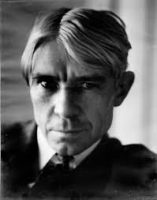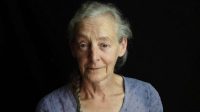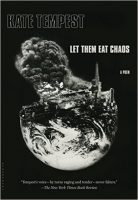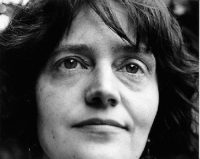January 6, 2017
Edited by David Sanders
Specimen Days
1488—Helius Eobanus Hessus, German poet (Silvae), is born.
1728—Domingos dos Reis Quita, Portuguese playwright/poet, is born.
1878—Carl Sandburg, US, poet/biographer of Lincoln (The People, Yes), is born.
1883—Khalil Gibran, Lebanon, mystic poet (The Prophet, Broken Wings), is born.
1906—Benedict Vilakazi, South Africa, poet/educator (Zulu-English Dictionary), is born.
1931—P J [Patrick Joeseph] Kavanagh, poet, actor and journalist (The Perfect Stranger), born in Worthing, Sussex (d. 2015), is born.

The woman named Tomorrow
sits with a hairpin in her teeth
and takes her time
and does her hair the way she wants it
and fastens at last the last braid and coil
and puts the hairpin where it belongs
and turns and drawls: Well, what of it?
My grandmother, Yesterday, is gone.
What of it? Let the dead be dead.
— from “Four Preludes on Playthings of the Wind” by Carl Sandburg
Carl Sandburg was born this week in 1878.
World Poetry
Gillian Allnutt Awarded Queen's Gold Medal for Poetry

Gillian Allnutt is to be awarded The Queen's Gold Medal for Poetry 2017, Buckingham Palace has announced. The medal is awarded for excellence in poetry and will be presented to Allnutt by the Queen in 2017. Allnutt, 67, from Esh Winning in County Durham, was recommended by the Poetry Medal Committee on the basis of her entire body of work.
Gillian Allnutt is to be awarded The Queen’s Gold Medal for Poetry 2017, Buckingham Palace has announced.
Recent Reviews
Review: Alice Oswald’s Falling Awake
by Dan Etches
Shortlisted for the 2016 Forward Prize, Falling Awake – Alice Oswald’s latest poetry book – bears great expectations. The boasts of the blurb similarly place Oswald in the company of some of the greatest poets of recent times, with mentions of Heaney, Hughes, and Hill. However, even as it meets these expectations, Falling Awake shows that the most interesting side of Oswald is one which cannot benefit from comparison; for here we find an intriguing poet with a distinctive voice and an eye for those fascinating collisions between the ordinary and the poetic.
The Best Books of Poetry in 2016
by Dan Chiasson
Most of 2016 was merely sickening, before the year ended up as painful as a boot kick to the exposed duodenum. Nor am I in the mood to affirm the permanence or enduring power of much of anything: I’m too busy gaining weight, erupting at my children, and losing touch with my friends. These days, it’s a morning highlight when I find a sweater on the floor that already has a shirt inside it. But when we reëmerge someday from our underground silos, nurtured by Tang and protein capsules and married to our first cousins, the following books may also have survived:
The Measure of Anger: On Alice Notley’s “Benediction”
By Steven Zultanski
The question of measure was at the forefront of “New American” poetic thought in the 1960s, when experimentation ushered in abstraction, colloquial language, collage, and uneven rhythms. Robert Creeley understood measure to be the potentially unruly rhythm and music of language as it flows through the poet in the act of writing. It is both a highly individualistic concept (related to the language patterns of a particular person), and an abstract and impersonal force (related to the movement of language as it exceeds intention). Thus “measure” in this context is distinct from meter; it intimates the particular rhythm of a poet, as opposed to a set pattern of syllables and stresses.
Then Come Back: The Lost Neruda Poems
by Magdalena Edwards
Forrest Gander opens his “Prologue” to Then Come Back with an admission: “It’s true, I’ve been caught in print several times saying, ‘The last thing we need is another Neruda translation.’” His caveat: this hesitation comes not from a lack of admiration for Pablo Neruda’s verses and the “attention he’s justly received,” but rather out of a desire to “champion terrific lesser-known and more contemporary Latin American writers in translation.”
Dan Chiasson weighed in on his favorite poetry books of 2016.
Broadsides
A Few Questions for Poetry
by Daniel Halpern
Why Poetry? Well, yes. Most books of poetry sell a couple of thousand copies, at best. So in a quantitative sense, what’s the point of supporting it? With dollars or sense? Would we make the same argument for investing in an endangered species? Like the great Indian bustard, one of the heaviest flying birds, down to a couple of hundred of its kind.
A Politics of Mere Being
by Carl Phillips
When my first book of poems came out in 1992, I learned what it could mean to be seen as a political poet for no other reason than because of who or what one is. Rachel Hadas, who selected the book for publication, wrote a wonderful and uncannily accurate introduction, from which the publisher excerpted the following for the back cover:
Internal evidence would seem to indicate that [this] is a poet of color who is erotically drawn to other men. The reductiveness of such terms is one lesson of In the Blood, with its … constant dissolving of one world into another.
I say uncannily accurate because I had yet to acknowledge to myself, let alone others, my being gay; about the color part, I’d been pretty aware, of course, all my life.
Why Walt Whitman Called America the 'Greatest Poem'
The 19th-century writer believed that the power of poetry and democracy came from an ability to make a unified whole out of disparate parts.
by Karen Swallow Prior
Shocked at the election of their next president, many Americans at the end of 2016 turned to social media, petitions, polls, and the streets in protest. A century and a half ago, shocked at the assassination of the sitting president who oversaw the reunification of a divided nation, Walt Whitman turned to poetry. In “O Captain! My Captain!”, Whitman famously eulogized Abraham Lincoln as the fallen leader of the great ship of America, which he called a “vessel grim and daring.”
Dan Halpern answers the question, “Why poetry?”
Drafts & Fragments
This is the Official Poem of 2016

All sorts of news publications have even asked if it was the “Worst Year Ever.” It’s been the year of a contentious US election season. The year of Brexit. The year of terrorist attacks all over the world. In the aftermath of many of these tragic or difficult events, there has been one poem — consistently shared over and over again. According to some estimates, it has been read by nearly a million people. The poem is called “Good Bones," by Maggie Smith, a poet in Bexley, Ohio.
“Good Bones” by Maggie Smith is the official poem of 2016.
Poetry In the News
Daniel Handler Launches Per Diem Press, With $1,000 Prize For Poetry
Upper Haighter Daniel Handler, better known to many readers as Lemony Snicket, the brain behind the bestselling children's book series A Series of Unfortunate Events and All the Wrong Questions, has a new project in the works: Per Diem Press, a new (very) small press dedicated to poetry.
David Meltzer, SF Beat Generation Poet and Musician, Dies

David Meltzer, the prolific poet and musician who merged his two passions, creating work that goes back to the Beat generation and San Francisco Renaissance of the 1950s and ’60s, has died. He was 79. Mr. Meltzer died peacefully Saturday at his home in Oakland after suffering a stroke, said his daughters. He was surrounded by loved ones.
David Meltzer, Beat poet and musician, has died.
New Books
Let Them Eat Chaos by Kate Tempest
[Paperback] Bloomsbury USA, 80 pp., $16.00

Let Them Eat Chaos, Kate Tempest's new long poem written for live performance and heard on the album release of the same name, is both a powerful sermon and a moving play for voices. Seven neighbors inhabit the same London street, but are all unknown to each other. The clock freezes in the small hours, and one by one we see directly into their lives: lives that are damaged, disenfranchised, lonely, broken, addicted, and all, apparently, without hope. Then a great storm breaks over London, and brings them out into the night to face each other–and their own last chance to connect.
Falling Ill: Last Poems by C. K. Williams
[Hardcover] Farrar, Straus and Giroux, 64 pp., $23.00
Over the past half century, the great shape-shifting poet C. K. Williams took upon himself the poet’s task: to record with candor and ardor “the burden of being alive.” In Falling Ill, his final volume of poems, he brings this task to its conclusion, bearing witness to a restless mind’s encounter with the brute fact of the body’s decay, the spirit’s erasure. Written with unsparing lyricism and relentless discursive logic, these brave poems face unflinchingly “the dreadful edge of a precipice” where a futureless future stares back. Urgent, unpunctuated, headlong, vertiginous, they race against time to trace the sinuous, startling twists and turns of consciousness. All is coming apart, taken away, except the brilliant art to describe it as the end is coming. All along is the reassurance of love’s close presence
The Wild Night Dress: Poems by Laura McCullough
[Paperback] University of Arkansas Press, 90 pp., $17.95
Laura McCullough finds passage through the darkest times as she loses, in short order, her mother and her marriage. Through her near unbearable grief, she creates poems that slip between science and nature as she grasps at coordinates in a world spun out of its orbit. From the God Particle to toroidal vortexes, from the slippery linguistics of translation to the translation of the body, McCullough brings readers to the mystery of surrender, and the paradox that what we bear can make us more beautiful, that there is a gift in grief.
The Analyst: Poems by Molly Peacock
[Hardcover] W. W. Norton & Company, 128 pp., $25.95
When a psychoanalyst became a painter after surviving a stroke, her longtime patient, distinguished and beloved poet Molly Peacock, took up a unique task. The Analyst is a new, visceral, twenty-first century “in memoriam” of ambiguous loss in which Peacock brilliantly tells the story of a decades-long patient-therapist relationship that now reverses and continues to evolve. Peacock invigorates the notion of poetry as word-painting: A tapestry of images, from a red enameled steamer on a black stove to Tibetan monks funneling glowing sand into a painting, create the backdrop for her quest to define identity.
Terra Nova by Cynthia Huntington
[Paperback] Southern Illinois University Press, 112 pp., $15.95
In this bold and ambitious book-length poem, National Book Award finalist Cynthia Huntington explores exile and migration—what it means to lose, seek, and find home in all its iterations—through a polyphonic work, written in multiple voices and evoking the method of Hart Crane’s The Bridge or the Nighttown episode in James Joyce’s Ulysses. Yet it is also a tough and vernacular work, owing as much to Patti Smith and the Clash as it does to High Modernism.
Let Them Eat Chaos, Kate Tempest’s new long poem written for live performance, is a powerful sermon & a moving play for voices.
Correspondences
Between the Living and the Dead: An Interview with Alice Notley
by Shoshana Olidort

Alice Notley has been hailed as one of the United States’s greatest living poets. She is the author of more than 25 books of poetry and the recipient of numerous awards, including, most recently, the Ruth Lilly Poetry Prize. Certain Magical Acts is her latest book. Notley’s work, which consistently pushes up against the limitations of language, seems to issue from an alternate reality. Among her most notable works is The Descent of Alette, an epic poem about the narrator’s katabasis into the subterranean bowels of the subway. The narrator’s mission: The elimination of the tyrant who is responsible for the suffering of all those he has banished to the dark, dank underground. Earlier this month, Notley, who lives in Paris, read the book-length (148-page) poem in its entirety, over two nights, at The Lab in San Francisco. I met up with the poet at her hotel in San Francisco on the morning between those two readings.
A Black Art Love Story
An interview with Elizabeth Alexander about her memoir The Light of the World.
by Kimberly Drew
"It's a black art love story," explains the poet, professor, essayist, and newly minted memoirist Elizabeth Alexander on a balmy October afternoon. Her book The Light of the World, which was a finalist for the 2016 Pulitzer Prize, tells the story of her whirlwind romance with her husband, Ficre Ghebreyesus, and his sudden death in 2012.
On Poverty, Justice, and Writing Sonnets of the South
Poet Melissa Range talks to Stephen Burt
Melissa Range is the author, most recently, of Scriptorium, a collection that combines Appalachian colloquialisms with reanimated Old English to explore questions of religious and linguistic authority. In the words of Tracy K. Smith, who selected it as the winner of the 2015 National Poetry Series, Range’s “most sacred text—the one inspiring the most rapt devotion—is the very vernacular we live, love, grieve, fumble, and forgive in.” As she explains in a statement on the collection, Range is “interested in speaking about environmental injustice and poverty in outsider Appalachia,” as well “in interrogating the ways religious doctrine, art, and language can silence people.” In conversation with Stephen Burt, professor of English at Harvard University, she discusses using poetry to address doubt, her love of rhyme, and America’s sudden fascination with rural identities.
Alice Notley has been hailed as one of the United States’s greatest living poets.
Envoi: Editor’s Notes
Over the holidays, I had the fortune to profit from another's misfortune: A friend and I stopped into the Whately Antiquarian Book Center in Whately, Massachusetts. We had planned to go as we've done in the past over the years, but we hadn't planned on the parking lot being full on the occasion of a going-out-of-business sale. As a result, I ended up with a small armload of treasures for about ten bucks—Marianne Moore, Greg Orr, Charles Simic, Rod Santos, and Howard Nemerov, among the finds. I'm looking forward to reading them all. The Nemerov I had owned at one time, but not in hardcover. Leafing through it (Sentences), brought me to one of Nemerov's gentler poems—something of an ars poetica, which has stayed with me for years.
Because You Asked about the Line Between Prose and Poetry
Sparrows were feeding in a freezing drizzle
That while you watched turned to pieces of snow
Riding a gradient invisible
From silver aslant to random, white, and slow.
There came a moment that you couldn’t tell.
And then they clearly flew instead of fell.
Here's a video of him reading the poem aloud.
“There came a moment that you couldn’t tell.” – Howard Nemerov